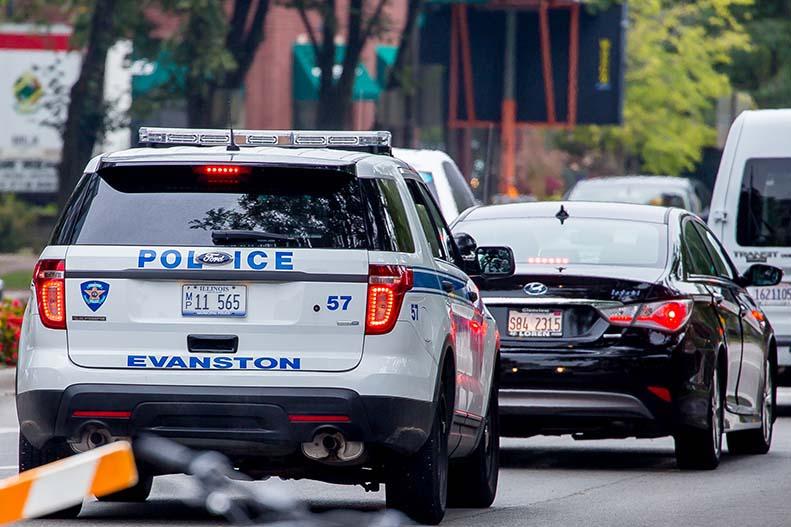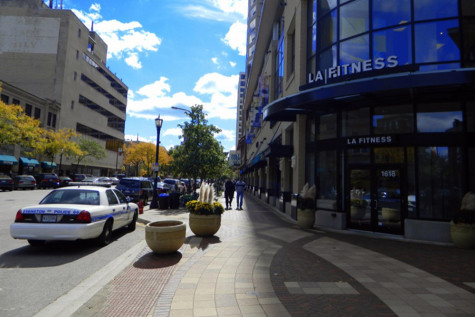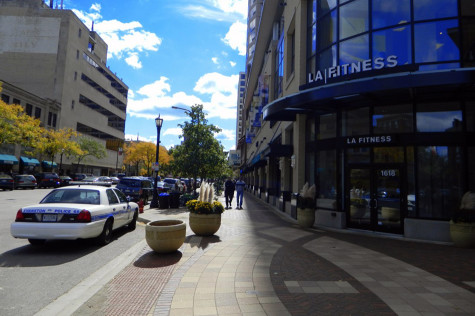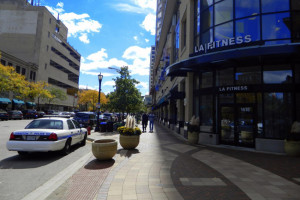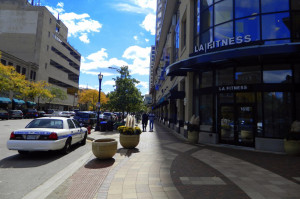Hurdles remain for police body cameras in Evanston
Zack Laurence/The Daily Northwestern
It is unlikely the Evanston Police Department will implement police body cameras within the next several months. Body cameras were legally permitted in Illinois last month.
September 21, 2015
Up to Date
Catch up on the biggest ongoing news stories affecting Northwestern and Evanston with The Daily’s new explainer series: Up to Date.
Although Illinois legalized police body cameras in August, Evanston’s police chief says it will be months before such cameras could be used in the city.
The new law explicitly permitting body cameras cleared up confusion for police departments across the state about whether such cameras were legal. However, even with that roadblock cleared, the future of body cameras in Evanston is still murky. Evanston police Chief Richard Eddington said he isn’t sure his force will begin using the cameras in the foreseeable future considering concerns over cost, privacy and necessity.
The 2014 shooting death of black teenager Michael Brown by a white police officer in Ferguson, Missouri, generated scrutiny across the country of racial disparities between police forces and the communities they are charged to protect. Limited evidence in the case also spurred many to call for police officers to record interactions with civilians on body-worn cameras.
“If it wasn’t for the events in Ferguson, Missouri, I doubt this bill would’ve passed,” Eddington said in a meeting with Evanston media last month.
The city first officially started considering cameras in February, when alderman decided to apply for a grant to help purchase such cameras. Cameras would increase transparency, help record evidence at crime scenes and aid the department internally to assess complaints filed against its officers, Evanston police Cmdr. Joseph Dugan told The Daily in February.
But with state budget cuts looming, Eddington said he isn’t sure Evanston needs body cameras right away.
Body cameras would present an additional financial burden for the department on top of a proposed budget decrease. City manager Wally Bobkiewicz has instructed all city departments to prepare for a two percent budget decrease, which would set EPD back about $560,000.
Implementing a body camera program at EPD is estimated to cost $400,000 the first year and $200,000 each year afterward, Eddington told The Daily.
“In the context of the budget discussion: Is the problem serious enough now to warrant body cameras for the police department?” Eddington told The Daily.
Ald. Jane Grover (7th) has said if the issue does come before the aldermen, she will weigh the costs of equipping the officers with cameras against the benefits. She said she thinks Evanston police officers have a relatively good relationship with the community, adding that Evanston doesn’t have the racial disparities between police and the community that are present in many of the cities that have come under the national spotlight.
For instance, in Ferguson just 11 percent of police officers are black, compared with 67 percent of Ferguson residents, according to data reported by The New York Times. In contrast, black people comprise 18 percent of Evanston’s population, according to the latest census, compared with 24 percent of its police force, according to the department.
“The Evanston police really do look like the community,” Grover told The Daily in January. “We’re not Ferguson. That’s for sure.”
Graphic by Benjamin Din/Daily Senior Staffer
The city expects to learn whether it will be awarded the grant in late September or early October, Eddington said. The grant will give the city a better idea of how much money it can spend on cameras.
If the city secures the grant, which would provide federal funding administered by Cook County, Evanston will have to match some of the funds the grant provides. When aldermen voted to apply for the grant, they effectively approved the funds Evanston will have to match if it receives the grant, Bobkiewicz told The Daily in February.
However, once the city learns whether it has received the grant, Eddington said he plans to bring the issue back before the council for more deliberation.
If after holding public discussions the city does decide to implement a camera program, Eddington said he will recommend delaying at least a year to wait for technology to improve. But in the meantime, he said he expects Evanston residents to have concerns over privacy issues related to the cameras. He cited the heated debate over installing cameras near Evanston Township High School to deter crime. The council approved the cameras, but failed to secure grant money to install them near the school.
“Body cameras will be exponentially more problematic for them,” Eddington said, referring to the Evanston residents who raised civil liberties issues during the ETHS cameras discussions. “I think there will be a robust debate.”
Email: [email protected]
Twitter: @SophiaBollag
